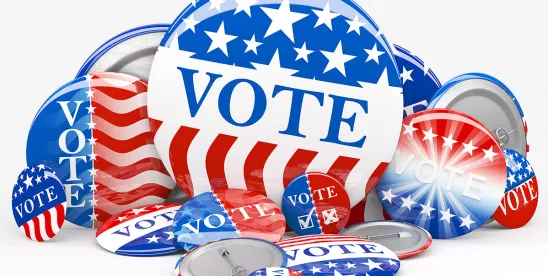With the election drawing near, questions about voting leave laws are becoming more frequent. Employers must understand a patchwork of state laws that regulate voting leave, political speech in the workplace, and related issues. As election season approaches, we are considering some of the intricacies of voting leave laws throughout the United States.
Quick Hits
- As Election Day—Tuesday, November 5, 2024—draws near, employers are considering their leave obligations.
- Various state, local, and municipal election-related laws have implications for multistate employers’ compliance plans.
- Notice posting and political speech laws also have implications for employers’ compliance plans.
Leave Obligations
There are three key issues employers may need to address when considering voting and election leave—posting notices, types of leave, and requests for leave.
- Posted Notices
Some states require employers to post notices informing employees about their voting leave rights. California and New York, for example, require these notices to be posted at least ten days before the election. The District of Columbia mandates that notices be posted at least sixty days prior to the election. In addition, a few states have requirements for smaller elections.
- Types of Leave
States vary in their requirements for voting leave. Some states mandate paid leave, while others require unpaid leave or no leave at all. For instance, Hawaii and Washington conduct all voting by mail, thus eliminating the need for voting leave laws. Connecticut recently sunset its election leave law due to its two-week voting window. States like Florida, Indiana, and Louisiana don’t have voting leave laws, making it essential for employers to understand the specific regulations in each jurisdiction.
- Request for Leave
The process for requesting voting leave can differ significantly. Some states, like Iowa, require a written request, while New York mandates notice at least two days before the election.
Paid Versus Unpaid Voting Leave
The landscape of voting leave laws is diverse. Some states require paid leave, while others do not. For example, Alaska mandates that employers provide as much paid time as an employee needs to vote. Arizona requires up to three hours of paid voting leave. Other states with paid leave requirements include California, Colorado, Illinois, Iowa, Kansas, Maryland, Minnesota, Missouri, Nebraska, Nevada, New Mexico, New York, Oklahoma, South Dakota, Tennessee, Texas, Utah, West Virginia, and Wyoming.
Interestingly, some states have specific conditions under which paid leave is not required. For instance, if an employee has enough time to vote before or after work while the polls are still open, paid leave may not be necessary. This creates a complex web of regulations for employers to navigate.
Developing a Voting Leave Policy
Creating a standardized voting leave policy can be challenging for national employers with employees in multiple states. Some companies opt for a more generous policy that applies the most lenient state requirements across the board. This approach simplifies administration but may not be feasible for all businesses, especially those needing continuous coverage, like healthcare providers.
Employers can also create state-specific supplements or addenda to their employee handbooks to address unique voting leave requirements. This allows for flexibility while ensuring compliance with state laws.
Additional Considerations for Employers
There are other considerations that employers might want to keep on their radar screens as Election Day draws close. One of these is a policy attempting to regulate employee speech about political issues. In this regard, employers may want to determine whether an employee’s speech may be considered protected concerted activity—or whether speech regarding voting in the workplace may be considered coercive.
In addition to the various laws granting employees time off to vote, employers may want to note that there are other election-related laws that may affect some employees’ need for leave. For example, some states require time off for election officials and voting machine technicians. Employers may also want to keep in mind that federal law does not require employers to provide employees time off to vote.





 />i
/>i

